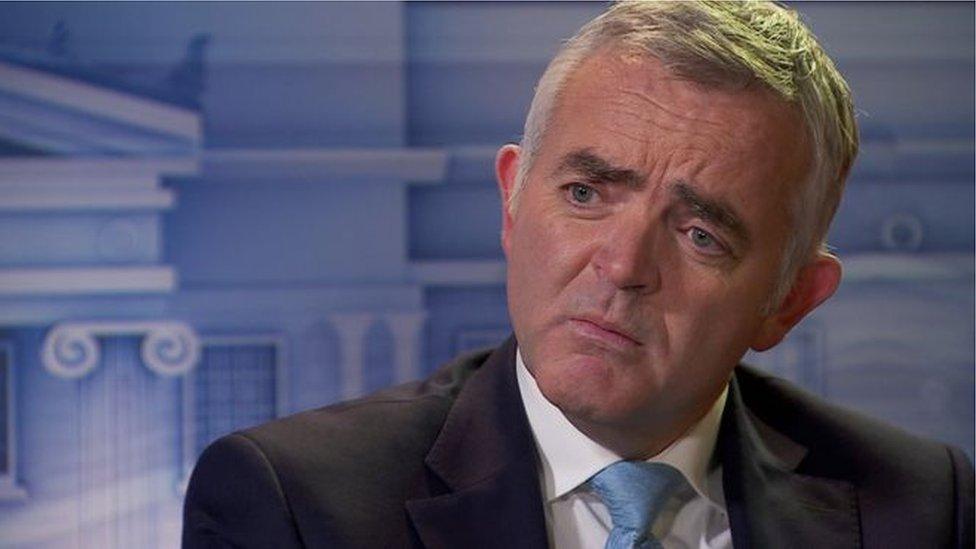RHI: Arlene Foster 'was told adviser delayed RHI cost controls'
- Published

Timothy Cairns is due to give evidence on Tuesday
A day before Arlene Foster told the BBC a senior official had no role in delaying RHI cost controls, she was told he had been involved, a former DUP adviser has said.
In December 2016, Arlene Foster was asked by Stephen Nolan whether the party's now-chief executive Timothy Johnston had any role in delaying subsidy cuts.
She said he had not.
But Timothy Cairns claims he told her of Mr Johnston's role the day before.
Timothy Cairns set out Mr Johnston's role in a conference call to which Mrs Foster and Mr Johnston and another DUP special adviser (Spad) Richard Bullick were all parties.
Mr Cairns is due to give evidence to the inquiry later on Tuesday, but his published witness statements refer to the conference call.
In them, he said he mentioned that Mr Johnston had told him to liaise with Mrs Foster's then Spad Andrew Crawford to develop a party position on the introduction of cost controls.
"Mr Johnston clearly became uncomfortable and the conversation was quickly brought to an end," Mr Cairns said.
'Undermined'
"Mr Bullick also informed me that Mr Johnston was uncomfortable with my discussion because up until that point he was adamant that he had played no role in RHI.
"However, my revelation had undermined his position."
Mr Cairns said he did not believe that Arlene Foster "in either her Nolan interview or in her (assembly) statement, fully expressed the view I had stated to her in the speaker phone call that Mr Johnston had given, at least initial, direction in this matter".
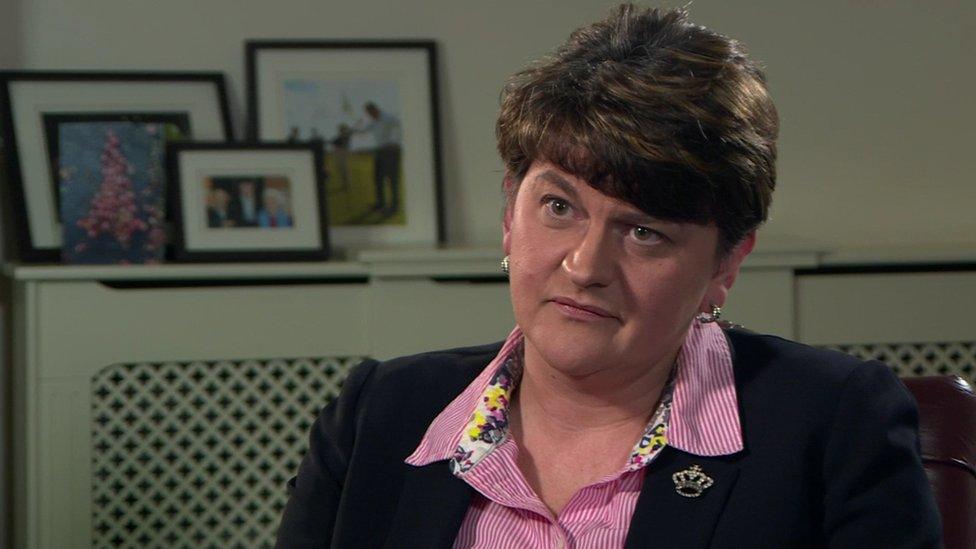
Arlene Foster told Stephen Nolan that the DUP's most senior official Timothy Johnston had no role in delaying cost controls to the RHI scheme
In one of Mr Cairns's three witness statements, external provided to the inquiry, he also said he had conversations with Dr Crawford about the scheme as requested by Timothy Johnston, due to Dr Crawford's knowledge about RHI.
Dr Crawford had been Arlene Foster's adviser at the enterprise department when the scheme was first set up.
Mr Cairns said he spoke to Dr Crawford several times about the date for applying cost controls to the scheme and the overspend on the budget - and that Arlene Foster had also been present with the pair during a meeting about the scheme in June 2015.
Mrs Foster is likely to be asked to explain her role in both the meeting and the conference call when she returns to give evidence in the coming weeks.
'Powerful individual'
Mr Cairns claimed in his evidence that Timothy Johnston was involved in the decision to delay RHI cost controls in late August 2015.
He also described Mr Johnston as a "powerful individual" who ran all matters relating to the party.
In 2015, Mr Johnston was an adviser to the then-First Minister Peter Robinson.
By summer 2015, officials in the Enterprise Department were aware of the major problems with the scheme, but cost controls were not implemented until November 2015.
The delay allowed hundreds of extra boilers into the lucrative scheme, and added a huge potential burden to the public purse until the subsidy payments were heavily cut.
Mr Cairns said it was the understanding of the other advisers and civil servants at the time that the bill would be met by the Treasury - a belief which was ill-founded.
He added that the decision to go for the latest possible date for tariff cuts was influenced by what had happened with a similar green energy scheme earlier that summer.
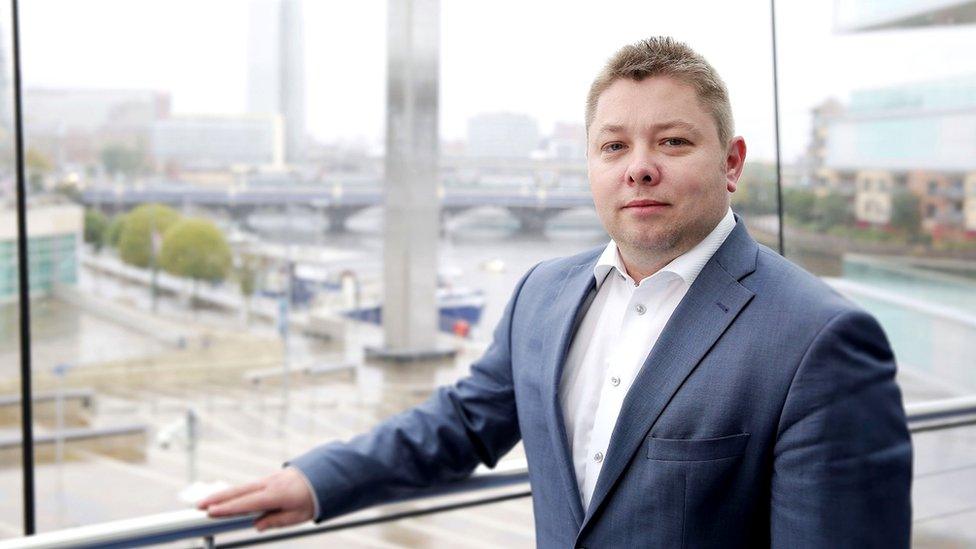
Timothy Johnston served as a special adviser to three first ministers: Ian Paisley, Peter Robinson and Arlene Foster
Westminster had cut the subsidies for onshore wind to the detriment of many in Northern Ireland.
Mr Cairns said the party had been lobbied by other MLAs, the Ulster Farmers' Union and by individuals who were keen that the same thing did not happen to RHI.
He also said another special adviser (Spad), Dr Andrew Crawford, who at the time was advising DUP minister Arlene Foster, was involved in the decision to delay the regulations.
"While Andrew Crawford and Timothy Johnston indicated that they would be content with a date in early October for cost controls, their view was that the latest possible date should be sought," Mr Cairns' statement said.
At the August meeting, Mr Cairns said no pressure was put on civil servants and he was surprised when the then head of energy division said officials could live with a date in early November.
'Proxy leader'
"I was surprised at the willingness to move the date from October to November," Mr Cairns said.
That early November date later slipped by several weeks due to procedural delay.
The RHI inquiry has already heard claims that DUP special advisers were taking "many decisions" as opposed to ministers, during devolution.
In his statement, Mr Cairns said Timothy Johnston "often acted as first minister/party leader proxy on many matters concerning the DUP's policy on issues and consequently executive policy".
He described Mr Johnston as a "powerful individual" who ran all matters relating to the party - and said he believed that Mr Johnston running party matters while a Spad was "operating outside of what he was permitted to do".
Mr Cairns' witness statements also reveal further the strained relationship between him and his former minister, Jonathan Bell.
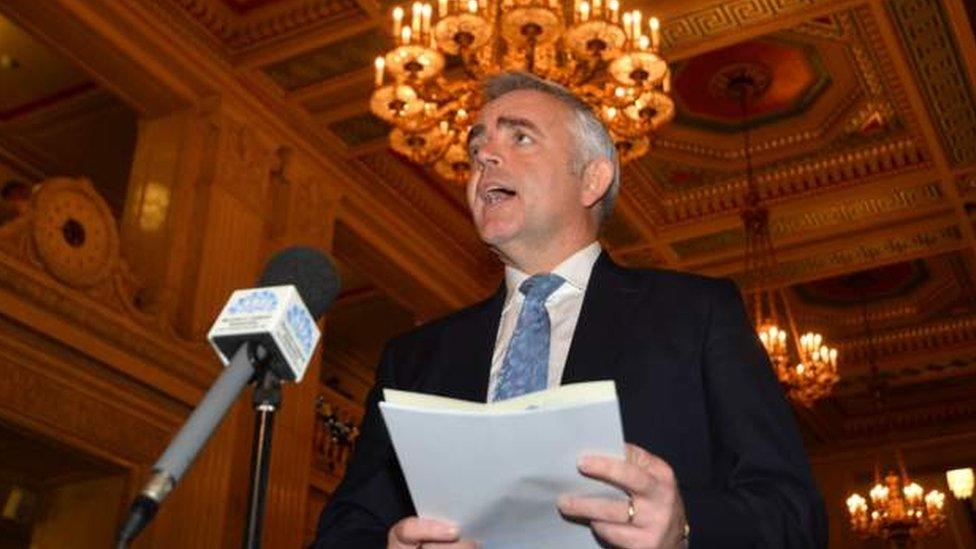
Jonathan Bell told the RHI inquiry he had a difficult relationship with his former special adviser, Timothy Cairns
He said Mr Bell had an "explosive personality" and often became aggressive.
Mr Cairns also gave his account of a row the pair had in London in 2015 over Mr Bell's authority to take decisions or whether certain issues should be referred to the wider party central first.
Mr Cairns claims he told Mr Bell: "Well Jonathan if you want to be the man with big balls and just make the decision go right ahead, but this is an East Belfast matter and if I was you I would consult Peter Robinson at the very least."
He then said Mr Bell became "enraged" and threatened to break his finger - Mr Bell has denied this claim.
Mr Cairns said after the incident with Mr Bell in London, he raised the allegations of bullying with the then Peter Robinson and Timothy Johnston.
He claimed Mr Robinson "made it clear that he was backing Jonathan (Bell) in the matter", while Mr Johnston advocated on Mr Cairns' behalf.
The former DUP Spad also told the inquiry he felt the former first minister did not do anything about his allegations of bullying against Mr Bell.
"I believe Mr Robinson was protecting Mr Bell's position. I have no idea why Mr Robinson sought to protect Mr Bell, that would be a matter only Mr Robinson could explain," added Mr Cairns.
He said he had discussed the allegations with several other high-profile party members including Arlene Foster, Simon Hamilton and Nigel Dodds.
'Breakfast at Tiffany's'
The witness statement includes a text message Mr Cairns sent to another former DUP special adviser, Richard Bullick, in December 2016, about difficulties with Mr Bell.
The message alleged on one occasion that Mr Bell "got so drunk me and his PS (private secretary) carried him to hotel in NYC".
Mr Cairns told the inquiry the text related to a trip he went on with Mr Bell and other departmental officials to New York, where on one evening the former minister became intoxicated and "fell asleep in the pub".

Who is Timothy Cairns?
Timothy Cairns became Jonathan Bell's adviser at the Enterprise Department in May 2015.
In Mr Bell's evidence to the inquiry, he admitted he had not chosen Mr Cairns to advise him, but signed a pre-written letter from the DUP confirming the selection.
It has emerged that the pair had a difficult working relationship throughout the course of their time together at Stormont.
Mr Cairns previously worked as an aide to Peter Robinson when he was first minister, but left his role as a DUP adviser after the assembly election in May 2016.
He is now the Community Transport Association's director of policy and public affairs for Northern Ireland.

He said a waitress said if Mr Bell did not wake up, they would have to leave.
Mr Cairns then said Mr Bell woke up, ordered another drink but then fell asleep again and the group was asked to leave.
"Mr Bell was unsteady and had to be helped back to the hotel while he sang the Deep Blue Something hit single "Breakfast at Tiffany's" at full volume," Mr Cairns claimed.
The witness statement also claims that Mr Bell had a lack of attention to detail on important government papers.
Mr Cairns said the minister had "rarely read his ministerial papers or briefing notes" and "often boasted to me that he only read the summary sheet".
But Mr Bell told the inquiry last week that he took every effort to read documents he was given and that the role of a minister was always busy.
'Hostile'
Mr Cairns said Mr Bell's temper was "well-known" in the party, and claimed he had spoken to two other party colleagues, Emma Little Pengelly and Michelle McIlveen, about allegations of bullying by Mr Bell.
Mr Cairns said Mr Bell had "cornered Ms McIlveen at the party conference and had berated her for some time until she broke down in tears".
Later in the witness statement, Mr Cairns said no special adviser in the DUP had wanted to work with Mr Bell.
He said he also "did not wish to be Jonathan Bell's Spad" but that he could not have raised any objection to the appointment.
Mr Cairns also gave more details about the relationship between Mr Bell and Arlene Foster, who he replaced as enterprise minister.
He said Mr Bell "continually stated" that Mrs Foster did not run the department, he did, and Mr Bell was frustrated that business representatives would complain about him to her.
"In particular Alistair Hamilton of Invest NI would often complain to Mrs Foster about Jonathan's conduct," he claimed.
He added that Mr Bell was "hostile" to receiving any advice from Mrs Foster about how to run the department.
'Veiled accusation'
The evidence also refers to a claim made by Mr Bell about a row involving the head of the civil service, David Sterling, and another former DUP Spad, Dr Andrew Crawford.
Mr Bell alleged he had been told by Mr Cairns that "David Sterling had shouted at Andrew Crawford: 'You kept this scheme open for the benefit of your family and you've caused a significant budgetary crisis in Northern Ireland'."
However, Mr Cairns said Mr Bell had not recalled the story correctly and that the conversation was between Dr Crawford and another Stormont official, Mike Brennan.
Mr Cairns said Dr Crawford had told him that Mr Brennan had made a "veiled accusation" that Dr Crawford was seeking to keep RHI open "to benefit family and friends".
He added that Dr Crawford was "outraged" by the suggestion. Dr Crawford has denied the claim completely.
Mr Cairns is due to give evidence to the RHI inquiry today and tomorrow.
On Thursday, Arlene Foster's former adviser, Dr Andrew Crawford, will appear at the inquiry again.
The inquiry's chair, Sir Patrick Coghlin, has previously said he expects the oral hearings to conclude at the end of October.

What was the RHI scheme?
The Renewable Heat Incentive (RHI) scheme was established to encourage uptake of eco-friendly heat systems over the use of fossil fuels.
However, an overgenerous offer of fuel subsidies meant it could cost taxpayers an extra £490m.
A public inquiry was set up into the flawed green energy scheme in January 2017.

- Published7 September 2018
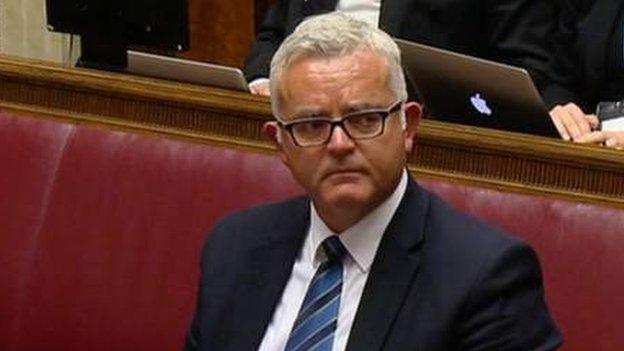
- Published7 September 2018
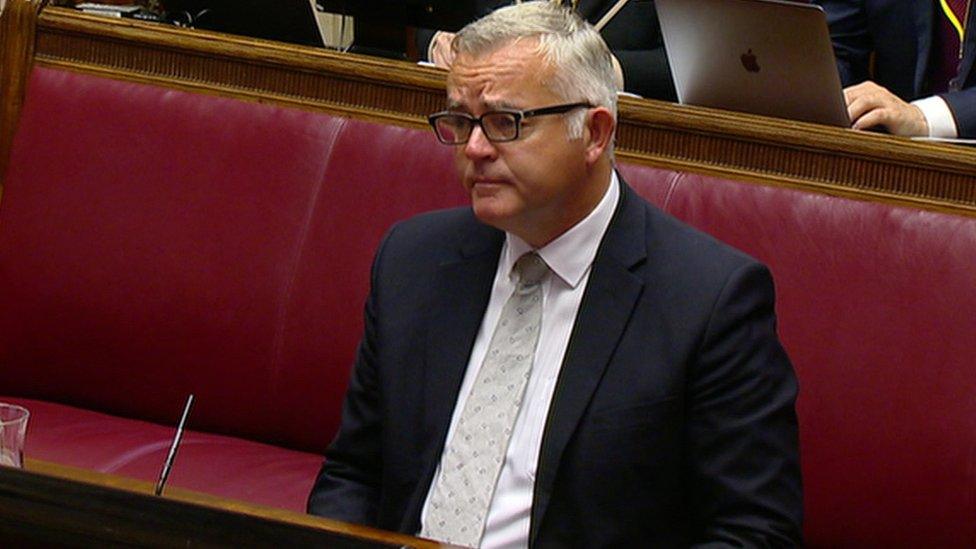
- Published5 September 2018
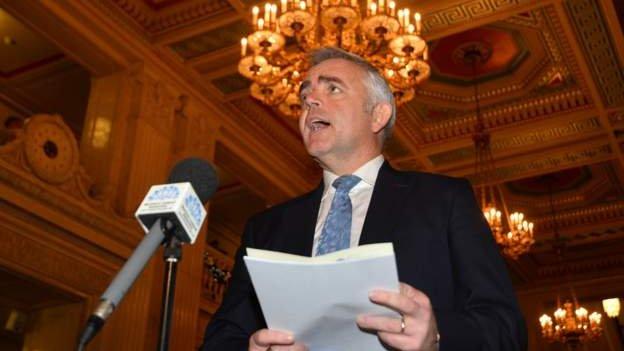
- Published5 September 2018
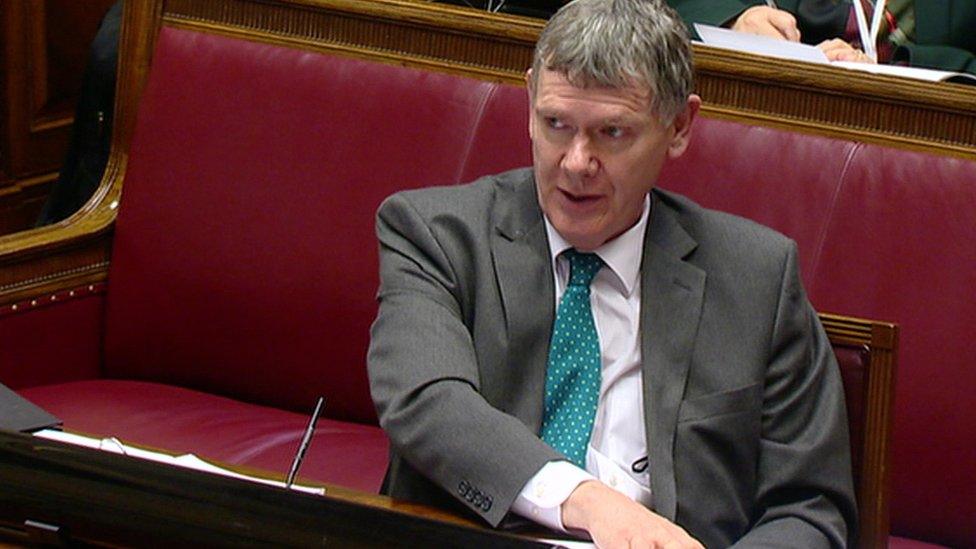
- Published5 September 2018
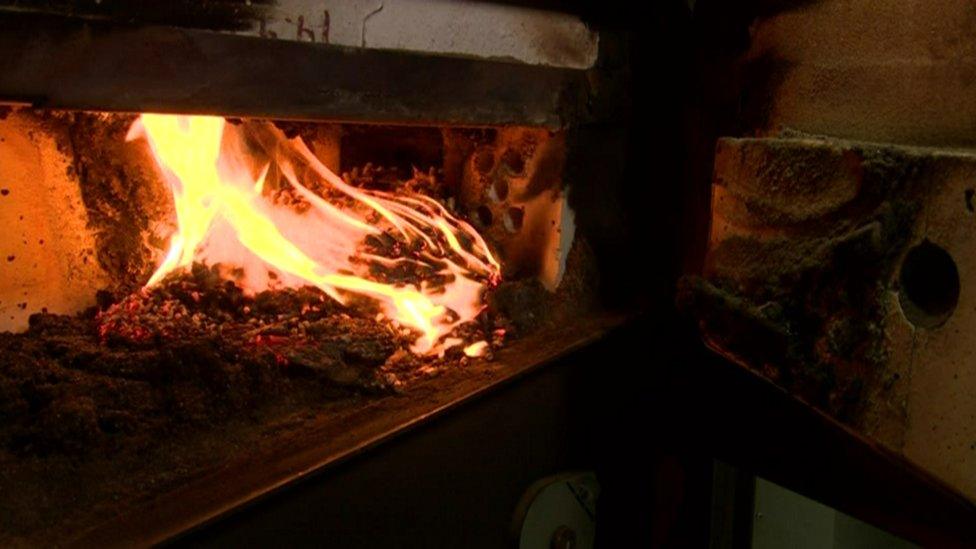
- Published13 March 2020
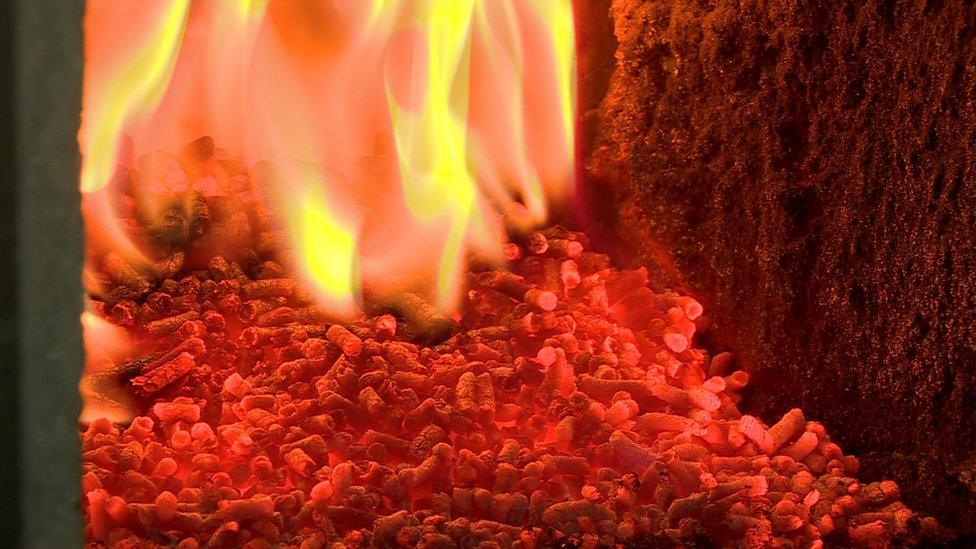
- Published4 September 2018
